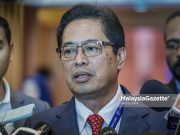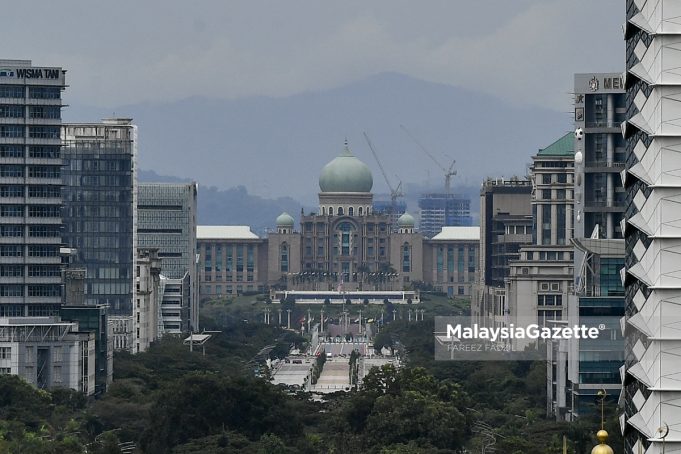By Ashraf Abdullah
Pressure is mounting on UMNO President Ahmad Zahid Hamidi to weigh his options, as two striking press statements on Sunday accused the government of deceit and concealing a royal decree by the 16th Yang di-Pertuan Agong Al-Sultan Abdullah mandating former Prime Minister Najib Razak’s house arrest.
The statements came from Gua Musang UMNO division chief Tengku Razaleigh Hamzah and Kelab Mahasiswa UMNO Malaysia (UMNOSiswa).
Tengku Razaleigh’s statement came as a surprise to many. Always known to be a man of finesse, tactful, polished, and soft-spoken, the former Gua Musang MP, issued a strongly worded statement expressing profound disappointment over the lack of action in enforcing the royal decree. The government’s “disrespect” for the royal decree had certainly incurred his wrath, so much so that he demanded for the resignation of Prime Minister Anwar Ibrahim and his government.
UMNOSiswa, the youth wing representing students from various institutions of higher learning, strongly echoed his sentiments. Their statement carried a powerful warning: the failure to take decisive action risks undermining public trust in Umno’s role as the defender of Malay rights and the monarchy. This declaration holds significant weight, as it captures the voices and concerns of the nation’s younger generation.
“We deplore the actions of the Prime Minister and relevant parties who seem to be denying the existence of the decree in the Dewan Rakyat. This non-transparent attitude violates the principle of integrity and can be considered a betrayal of the people’s mandate and the country’s constitution”, UMNOSiswa said.
These statements reflect mounting internal pressure within UMNO for Zahid to take a stand, either by supporting the royal decree or reconsidering the party’s alliance with the Anwar-led government. To put it simply, Zahid Hamidi’s leadership is under the rakyat’s scrutiny.
The Malays are unhappy, and if it is translated into votes, it’s going to be costly to UMNO. At the next general election, which will happen in 2027 or earlier, UMNO may just slip into oblivion.
The Malays have long been regarded as having a deep-seated loyalty to the monarchy, which is a defining feature of the country’s socio-political landscape. The institution of the monarchy is not merely symbolic; it represents a continuity of tradition, culture, and moral authority for the Malay community. The rulers are seen as custodians of Islam, protectors of Malay customs, and a unifying figurehead.
The royal addendum issue carries significant weight, as it embodies the aspirations and concerns of the monarchy in addressing national issues. If the government, in which UMNO is a key partner, fails to execute this directive, it risks alienating a crucial segment of its support base.
In the eyes of many Malays, the monarchy represents the last bastion of hope and justice, particularly when trust in political institutions wavers. The rulers are seen as impartial and deeply connected to the people’s welfare. Any government action—or inaction—that appears to undermine the monarchy could create a perception that UMNO and its allies are disconnected from the values and concerns of the Malay grassroots.
UMNO, a party that has historically drawn its legitimacy from being the defender of Malay rights and Islam, risks losing its identity if it fails to align itself with the sentiments of the Malay community. This dissatisfaction could manifest in the ballot box, particularly in rural constituencies where the monarchy’s influence is most deeply entrenched and where UMNO and Barisan Nasional draw most of its support from.
UMNO’s political survival is intrinsically tied to its ability to project itself as the guardian of Malay identity. Ignoring the royal addendum could tarnish this image, making it increasingly difficult for the party to retain its relevance and appeal among Malays.
The Role of the Conference of Rulers
The controversy has also reignited discussions about the powers of Malaysia’s monarchy, particularly the prerogative of the King to issue pardon-related decrees outside the meetings of the Pardons Board. Legal experts and constitutional scholars argue that the monarchy’s authority must be preserved to prevent political encroachment.
Therefore, it is time for the Conference of Rulers (CoR), to intervene and uphold the powers of the 16th YDP Agong and ensure that future monarchs retain their constitutionally enshrined authority. Critics warn that failure to support the Al-Sultan Abdullah’s decree could reduce the monarchy to a ceremonial role, leaving it vulnerable to political manipulation.
At the heart of the debate is whether the King is bound by the advice of the Pardons Board when issuing a pardon or decree. Several landmark court cases have affirmed the King’s discretion in this matter. For instance, in Abdul Malek Hussin v Borhan Hj Daud & Ors (2008), the Federal Court held that the King’s prerogative powers, including the granting of pardons, are not entirely subject to the advice of the Pardons Board.
In the Supreme Court case of Sim Kie Chon v Superintendent of Pudu Prison & Ors (1985) Sim Kie Chon commenced legal proceedings to challenge the decision of the Pardons Board to reject his petition for clemency on the basis that the Pardons Board had previously commuted the death sentence of Mokhtar Hashim (a former Minister of Youth and Sports) who was convicted of the murder of Datuk Mohamad Taha Talib, a former Negri Sembilan State Assemblyman.
In dismissing this contention, the Supreme Court made it clear that it was not the function of the Pardons Board to commute a death sentence. The role of the Pardons Board was limited to merely tendering advice to the YDP Agong, but it was His Majesty himself who exercised the executive power, which was one of a high prerogative of mercy.
These binding judicial precedents underscore the need for the monarchy’s powers to be protected from political interference. Supporters of the royal decree argue that any attempt to subordinate the King’s prerogative to political processes undermines the constitutional balance envisioned by Malaysia’s founding fathers.
It is also evident that a succeeding King withholding, overruling, amending, or changing a predecessor’s decree will establish a significant precedent, compelling future Kings to contend with the possibility of their own decrees being similarly overturned. This creates a potential ripple effect, which could lead to instability or resistance, as not all future Kings may be inclined to accept such challenges to their authority.
The silence of the CoR on this issue thus far, has led to growing unease among royalists and constitutionalists. They argue that the rulers must take a collective stand to affirm Al-Sultan Abdullah’s authority when he was King and prevent the monarchy from being perceived as a mere “rubber stamp.”
If the rulers do not step in to support Al-Sultan Abdullah’s decree, they risk establishing a perilous precedent that diminishes the authority of monarchy, an institution that Malaysians so jealously protect.
It is not about Najib Razak. Looking at it as a pure Najib Razak issue, will be myopic. It extends far beyond it. It is about protecting the powers of the monarchy and ensuring it remains a cornerstone of Malaysia’s democracy.
As Tengku Razaleigh aptly put, “this is a moment of truth for our nation. We must decide whether we are willing to uphold the principles that have guided us for decades, or whether we will allow political expediency to dictate our course.”
For now, all eyes are on the CoR, UMNO, the courts and the Anwar-led government as the world awaits a resolution to this constitutional crisis.
-Ashraf Abdullah is former Group Managing Editor, TV Networks, Media Prima Berhad. He has been a journalist for more than 30 years.
This article represents the author’s point of view and does not reflect the editorial stance or principles of Malaysia Gazette.

















